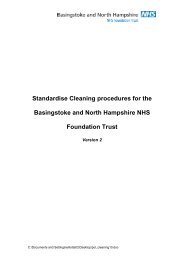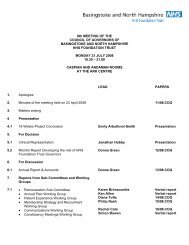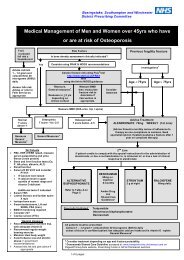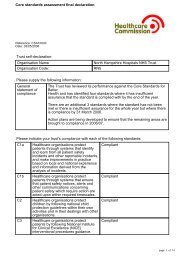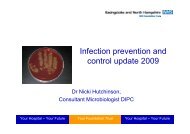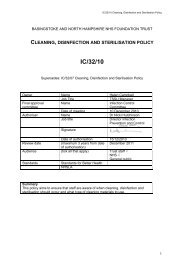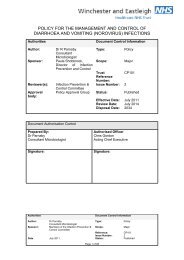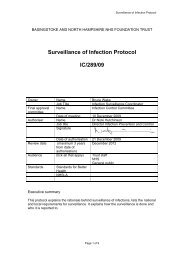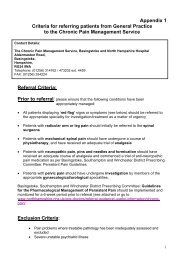Isolation and infectious diseases policy - Hampshire Hospitals NHS ...
Isolation and infectious diseases policy - Hampshire Hospitals NHS ...
Isolation and infectious diseases policy - Hampshire Hospitals NHS ...
Create successful ePaper yourself
Turn your PDF publications into a flip-book with our unique Google optimized e-Paper software.
Winchester & Eastleigh Healthcare <strong>NHS</strong> Trust<br />
Policy for <strong>Isolation</strong> <strong>and</strong> Infectious Diseases Policy<br />
Transmission within hospitals is mainly on h<strong>and</strong>s contaminated by contact with<br />
colonised or infected patients. H<strong>and</strong> washing is extremely important as a means of<br />
controlling infection.<br />
The environment in close contact with the patient may also be contaminated,<br />
especially is the patient has diarrhoea, <strong>and</strong> serves as a source of contamination of<br />
staff h<strong>and</strong>s. Thorough cleaning of the environment is essential.<br />
When a patient with GRE is identified, the patient <strong>and</strong> their contacts within the ward<br />
must be screened for GRE.<br />
Faeces are the most useful screening specimen for outbreak situations.<br />
A GRE screen includes<br />
Rectal swab <strong>and</strong> a perineum swab<br />
Stool sample<br />
Wound swabs – leg ulcers, IV cannula, tracheostomy sites<br />
CSU<br />
Patients at risk of having GRE are<br />
A history of previous hospitalisation<br />
Recent antibiotic therapy <strong>and</strong>/or multiple antibiotic therapies<br />
Underlying disease especially hepatobilary disease<br />
Permanent indwelling invasive devices e.g. PEG <strong>and</strong> urinary catheter<br />
Patients in ITU / HDU<br />
Infection Control Precautions<br />
Isolate in a side room <strong>and</strong> barrier nurse<br />
Wear gloves <strong>and</strong> yellow apron each time you enter the room.<br />
Deep clean the contact bay after the affected patient has been moved<br />
out<br />
Close the bay to admissions <strong>and</strong> transfers<br />
Barrier nurse the remaining patients in the bay<br />
Screen the contacts<br />
Treatment<br />
GRE lives in the bowel <strong>and</strong> research indicates that eradication attempts have not<br />
been successful or worthwhile. On occasions it will be necessary to teat a patient’s<br />
clinical infection with GRE. Advice must be sought from the Microbiologist.<br />
Patients with GRE who are having surgery or insertion of invasive devices may<br />
require different prophylactic antibiotics from those recommended in the Antibiotic<br />
32<br />
Authorities<br />
Document Control Information<br />
Author:<br />
Sponsor:<br />
Date:<br />
Dr Kordo Saeed<br />
microbiologist<br />
Sue Dailly Lead Nurse<br />
Infection Prevention <strong>and</strong><br />
Control<br />
Paula Shobbrook Director of<br />
Infection Prevention <strong>and</strong><br />
Control<br />
01/08/11<br />
Type:<br />
Scope:<br />
Reference:<br />
Issue No:<br />
Status:<br />
Policy<br />
Major<br />
CP022 (IC 04)<br />
4<br />
Published



